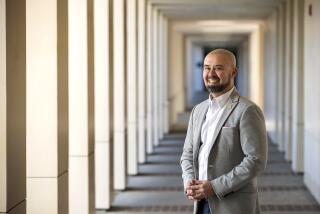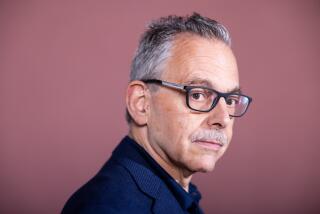He’ll Take You Higher--Scholastically
- Share via
When the Rev. Ozel Brazil was in high school in Detroit, a counselor told him he should attend a trade school after graduation because his grades were marginal.
Brazil had other ideas. He went on to become the first African American student body president of Northern Michigan University, earned a law degree and two master’s degrees, and last year received his ordination as a pastor at the First A.M.E. Church of Los Angeles.
To help and encourage other minority high school students to go after higher education, Brazil created his church-based College Prep Program at First A.M.E. in 1986. In its first years, the program drew 10 to 30 teen-agers annually. After the 1992 riots, the roll-call increased to 136 and has since grown to more than 550.
After Brazil was ordained in 1994, he left First A.M.E. in South-Central for his own parish in Lompoc and established another college advisory service, the Los Angeles Community Outreach Program at Loyola Marymount University, which currently assists 450 high school students and their parents. He is also a consultant to teen programs at two other churches, serving about 100 more participants.
Brazil began one recent LMU session with a prayer, then minced no words.
“Some of you waited and did not mail off your Cal State applications--you’re relying on all-black institutions. Well, you’re dummies,” he informed his audience. “You’re just STOL--Stiff Out of Luck--right now. Because if you’re denied financial aid and if your parents can’t pay. . . .”
During the remainder of the 90-minute session, Brazil explained the intricacies of financial aid application forms and how schools disburse money, noted the importance of taking college core courses and answered questions from students and parents.
“We advise in four phases,” Brazil, 45, says.
The first is the college application. Many minority students only apply to a limited number of schools, he says. “We have students apply to nine to 11 schools, which raises the acceptance level. Even a marginal student with a 2.0 grade-point average should apply, because we know of open enrollment institutions where the G.P.A. is not a criterion.”
Phase Two covers financial aid. The third focuses on academic performance, the fourth on enhancing motivation. “We take our students out of the process of non-productivity and force them into productivity,” Brazil says. “We provide them with an avenue of understanding that they are not in the world by themselves.
“We talk about real issues--racism, sexism, date rape,” he says. “We bring in bank experts to talk about things like how to balance a checkbook, and old people who talk about their experiences.”
Brazil also offers advice on coping with family pressures and other personal crises, sometimes visiting students’ homes. His program, a subsidiary of the nonprofit International Child Abuse Foundation, is open as well to students who are homeless or live in rescue missions. Because about half of the participants aspire to acceptance at predominantly black institutions, he conducts a tour each spring of the leading black colleges and universities.
His endeavors receive a glowing review from the administrator who provided Brazil his Loyola Marymount home base.
“Dr. Brazil is able to give students the attention that quite often they could not get from high school counselors, who see so many students,” says LMU admissions counselor Charles Mason. “I’ve seen a lot of students who might not have gone to college be able to go. They have a sense of accomplishment, of self-esteem.”
The college-prep program “can be a life-changing kind of happening for them,” Mason says.
Brazil’s efforts, which he estimates produce a 95% college acceptance rate, do not end upon graduation. Students can receive his assistance throughout college.
One such beneficiary is 19-year-old Nikol Brown, a second-year biology major at LMU. Cold and miserable during her freshman year at Syracuse University in New York, she asked Brazil to help her transfer to a Southern California school.
“I’d messed up my grades at Syracuse,” Brown says. “Dr. Brazil knows a lot of people. He wrote me a letter of recommendation and he worked closely with Charles Mason at LMU, who accepted me.
“Dr. Brazil is like the greatest man alive,” she adds. “He helped me so much. I don’t know what I’d do without him.”
* This occasional column tells the stories of the unsung heroes of Southern California, people of all ages and vocations and avocations, whose dedication as volunteers or on the job makes life better for the people they encounter. Reader suggestions are welcome and may be sent to Local Hero Editor, Life & Style, Los Angeles Times, Times Mirror Square, Los Angeles, Calif. 90053.
More to Read
Sign up for Essential California
The most important California stories and recommendations in your inbox every morning.
You may occasionally receive promotional content from the Los Angeles Times.













